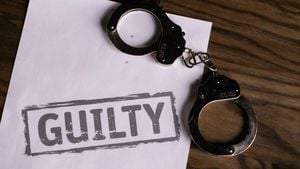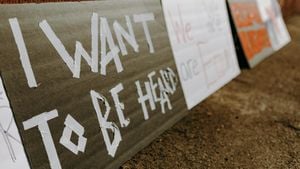Georgian authorities have faced intense backlash following a violent crackdown on protesters who have been rallying against the results of last month's parliamentary elections. These elections, held on October 26, saw the ruling Georgian Dream party retain power amid allegations of widespread vote manipulation, raising concerns over the nation's democratic integrity.
On November 19, 2024, police moved aggressively to dismantle protest camps set up by demonstrators in Tbilisi, the capital of Georgia. The protests erupted after numerous citizens reported suspected electoral fraud, claiming the results were influenced by Russian interference. These claims are amplified by accusations of intimidation and voter suppression tactics directed at opposition groups.
Footage captured by independent media outlets revealed the violent confrontations between the police and protesters, showcasing scenes where several demonstrators were beaten, and at least one journalist was detained during the clashes. Reports indicated chaos as the police intervened, with many protesters calling for fresh elections to address the corruption they believe taints the current regime.
Nika Gvaramia, leader of the opposition Akhali party, condemned the police's actions, stating, "Our party's political council has faced severe crackdown, with members detained and harmed. We will not stand idly by as our rights are stripped away." The Interior Ministry defended its aggressive stance, claiming the police were acting to restore order, saying, "Freedom of assembly cannot infringe upon public conduct or obstruct daily life for citizens."
Amplifying the political turmoil, Georgian President Salome Zourabichvili has also publicly disputed the election's legitimacy. She has claimed the elections have fallen under pressure from Moscow and poses serious risks to Georgia's aspirations to align with the European Union. Following the uproar, she has filed a lawsuit with the country's constitutional court demanding the annulment of the election results, citing substantial breaches of voting confidentiality and integrity.
"This election has been stolen," said Zourabichvili during her announcement. Her attorney, Eka Beselia, emphasized the seriousness of these allegations, stating, "These widespread violations cannot stand without scrutiny. It is imperative they be addressed through legal channels to restore faith among our citizens."
Throughout the nation, citizens have gathered en masse, voicing discontent not just with election fraud but also with the perceived authoritarian drift of the Georgian Dream party, which has been accused of catering to Russian interests. Recent polling shows growing support for opposition parties, with many Georgians expressing discontent over the government's handling of civil liberties.
The European Union and the United States have echoed concerns, urging independent investigations to be launched to probe the alleged electoral irregularities. Josep Borrell, the EU's chief diplomat, has announced plans to send a mission to Georgia to oversee these investigations and urged accountability for any electoral misconduct.
This discontent has been brewing since the introduction of controversial legislation requiring organizations receiving more than 20% of their funding from abroad to register as foreign agents. This law has been compared to similar restrictions placed on media and NGOs operating within Russia, raising alarms over its potential to stifle dissent and undermine independent journalism.
Against this backdrop of political strife and allegations of police brutality, the protests have become not just a reaction to the election outcomes but represent wider grievances against threats to press freedom and civil liberties. Journalists covering these events have found themselves increasingly at risk, facing violence and harassment at the hands of authorities. Organizations honoring press freedoms have rallied to support those targeted, condemning the government's heavy-handed tactics to intimidate critics and suppress dissenting voices.
Response from the global community has been swift, with multiple organizations calling for enhanced protections for journalists and civil activists. Emails and public outcries are pouring in from around the world demanding accountability from the Georgian government to restore trust and support for democracy.
With protests continuing, the future hangs precariously as the citizens of Georgia insist upon transparency and fairness from their leaders, daring to dream of reforms and the true potential of democracy within their nation.



